County Magazine | January 29, 2024
A Day in the Life of an Election Clerk

It's not unusual for Moore County Clerk Brenda McKanna to find herself working 14 hours a day during election season. Despite characterizing the most recent election in November as more relaxed than usual, with mostly state propositions on the ballot, she still managed to keep her week packed full of responsibilities.
As the clerk for a smaller county, McKanna often shoulders a broader range of responsibilities than her counterparts in larger counties, handling everything from meeting agenda minutes to all county records, and, of course, elections.
"Usually, I take everything hour by hour," McKanna said. "But it comes with the job. I knew what I had signed up for."
Arriving at her office nestled inside the courthouse in downtown Dumas — a town with a population of 14,000 — at 7 a.m. on the day before Election Day, McKanna is met with a stack of marriage licenses, birth and death certificates, and court records. Before she could even think about the setup for Election Day, she had dozens of other tasks to check off her list.
With clear determination and intense focus, she completed them all by midmorning, and then, the fun began.
Accompanied by her newest worker in the passenger seat, McKanna loaded her car and hopped into the driver's side with a smile, fully aware of the long day ahead.
A 120-mile trek awaited them as they traveled from one voting site to the next — the farthest being 45 miles southeast in Fritch — to requalify early voting numbers, swap equipment, and affix signs on the doors notifying constituents that only two of Moore County's seven precincts were hosting voting sites. Although she acknowledged that anyone in her office or the precinct election judge could have taken on the task, she explained that she chooses to oversee it all.
Although she has full confidence in her employees and poll workers, if there are ever any errors, the county clerk is the one who is held responsible, she said.
"The main thing for me is to hold my integrity and to reassure the public that we are having fair elections on a county level," said McKanna. "Sometimes I say, ‘Fake it till you make it,' but there's no faking anything in elections. If you do make a mistake, you own it and try to find the solution to make it right. In elections, you never want to try to hide something."
With only a 6% voter turnout by the end of early voting, McKanna didn't anticipate Election Day on Nov. 7 to be as busy as usual. Her main responsibility was tabulating the final numbers and submitting them to the Secretary of State, although she did promise a few community members throughout the day that she would text them the outcomes of various ballot items.

"I may send an email at 1 a.m., and at 1 a.m., I may also get a response," McKanna joked.
When there are more ballot items, such as the upcoming March 5 presidential primary for which she has already started preparing, her days typically begin at sunrise, and seldom does she get home before nightfall.
She assists elections helpers with any challenges they may face, but McKanna spends most of her Election Day away from the booths and in the kitchen, preparing meals for her poll workers.
"The entire office cooks for them and has a big spread ready for them when they bring in equipment and final results," McKanna said. "We try to take good care of them because it's very important for me to keep experienced poll workers."
Then, it all culminates on the following Wednesday, when she drives that same 120 miles to take down all signs and equipment, preparing to do it all again in four to six months.
With more than 50 years at Moore County, where she started in the tax office almost immediately after high school in 1972, McKanna has pretty much seen it all: disgruntled candidates, one-vote victories, the shift from a Democratic-swinging community to the now-Republican county, and the transition from hand-counted paper ballots to electronic voting.
"To me, we are public servants. We are here to serve the public and do our best," McKanna said. "I love to serve the public. People always ask when I plan on retiring, and I always tell them, ‘When I don't love my job anymore.'"

